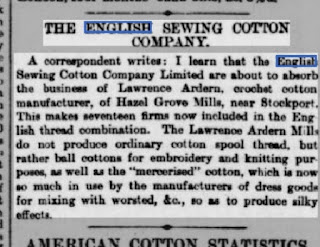Workers in World War One
In January 1916, conscription was introduced in order to obtain more front line troops for the trenches. As the war went on, such was the government's desperation to obtain more cannon fodder, the upper age limit was pushed up to 50!
Some occupations were protected and companies (as well as the individuals concerned) could appeal conscription for their workers if they could prove that their work was vital. In November 1917, The Derbyshire Advertiser published an item titled "Belper Tribunal". This was a report into the military tribunals that had taken place to decide whether local workers should be sent for military service. This being Belper, a town dominated by the mills established by the Strutt family, a lot of the men in question were English Sewing Cotton Company employees. In fact, the military tribunal was chaired by Alderman G H Strutt - the mill owner himself! Perhaps this went in favour of some of the men, if he had a thorough understanding of what their work entailed. The individual cases that are mentioned offer little insights into the work at the ESCC Belper mills.
One man was allowed 3 months exemption from military service. He was a 38 year old mill bricklayer, responsible for repairs at the works. ESCC appealed, claiming his was a certified trade.
Another was allowed 6 months exemption. He was a 41 year old Water Softener. "He had to climb a perpendicular ladder twenty times a day, and he also had eight water pumps to attend to."
The ESCC also appealed on behalf of a foreman in the sizing department. He was aged 25 and after previously being refused for military service three times on account of heart trouble, he had recently been passed as fit for service. "He was responsible for 48 machines, and his occupation was of a highly dangerous nature." He was given 3 months exemption.
Finally, the ESCC appealed a case of a 22 year old who was a yardman and practically blind, having had six eye operations and had to wear powerful glasses. He had been passed fit C3 - suitable for sedentary work for the forces. The tribunal sensibly granted him a conditional exemption, as long as he remained in his present job.




Comments
Post a Comment